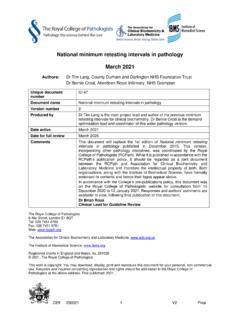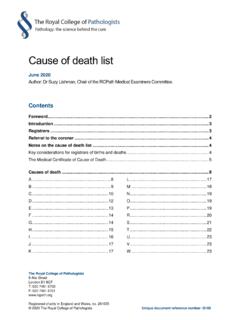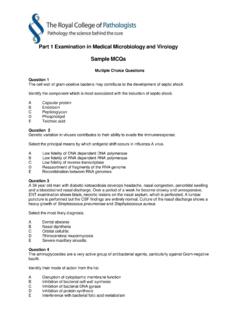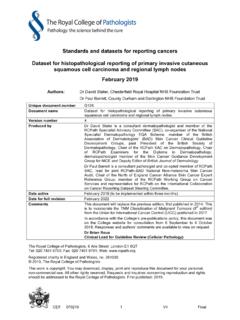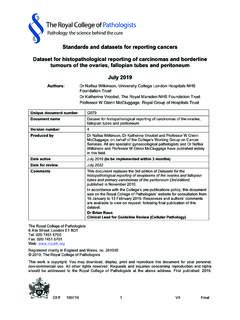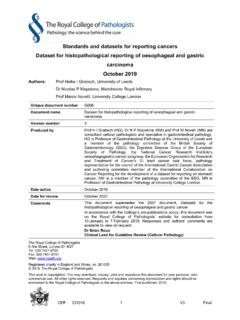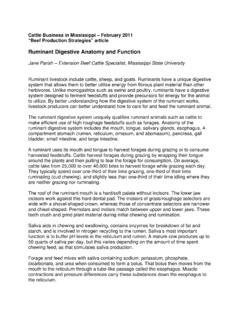Transcription of G081 Dataset for histopathological reporting of ...
1 Standards and datasets for reporting cancers Dataset for histopathological reporting of neuroendocrine neoplasms of the gastroenteropancreatic tract October 2019. Authors: Dr Tu Vinh Luong, Royal Free London NHS Foundation Trust Dr Jennifer Watkins, Royal Free London NHS Foundation Trust Dr Bipasha Chakrabarty, The Christie NHS Foundation Trust Dr Lai Mun Wang, Ludwig Institute for Cancer Research, University of Oxford Unique document G081. number Document name Dataset for histopathological reporting of neuroendocrine neoplasms of the gastroenteropancreatic tract Version number 4. Produced by Dr Tu Vinh Luong (TVL), Dr Jennifer Watkins, Dr Bipasha Chakrabarty and Dr Lai Mun Wang, on behalf of the College's Working Group on Cancer Services. All four authors are senior gastrointestinal and hepatopancreatobiliary histopathologists specialising in neuroendocrine neoplasm pathology of the gastroenteropancreatic tract and have worked and/or are working in certified European Neuroendocrine Tumor Society (ENETS) Centres of Excellence for the treatment of neuroendocrine tumours.
2 TVL is a member of the Clinical Practice Subcommittee and Programme Organising Subcommittee of the UK. and Ireland Neuroendocrine Tumour Society (UKINETS) and a member of the TRANSNET (Translational Research group in the fields of NETs). Date active October 2019 (to be implemented within 3 months). Date for full review October 2022. Comments This document replaces the third edition of the Dataset for neuroendocrine tumours of the gastrointestinal tract including pancreas published in 2012. In accordance with the College's pre-publications policy, this document was on the Royal College of Pathologists' website for consultation from 2 to 30 May 2019. Responses and authors' comments are available to view following final publication of this Dataset . Dr Brian Rous Clinical Lead for Guideline Review (Cellular Pathology). The Royal College of Pathologists 6 Alie Street, London E1 8QT. Tel: 020 7451 6700. Fax: 020 7451 6701.
3 Web: Registered charity in England and Wales, no. 261035. 2019, The Royal College of Pathologists This work is copyright. You may download, display, print and reproduce this document for your personal, non-commercial use. Requests and inquiries concerning reproduction and rights should be addressed to the Royal College of Pathologists at the above address. First published: 2019. CEff 161019 1 V4 Final Contents Foreword 4. 1 Introduction .. 5. 2 Clinical information required on specimen request form .. 8. 3 Preparation of specimens before 8. 4 Specimen handling and block selection .. 9. 5 Core data items .. 10. 6 Non-core data items .. 21. 7 Pathological 22. 8 reporting of local excision specimens of gastrointestinal neuroendocrine neoplasms .. 24. 9 reporting of small biopsy specimens .. 25. 10 reporting of frozen sections .. 25. 11 SNOMED coding of gastroenteropancreatic neuroendocrine neoplasms .. 25. 12 Criteria for audit.
4 26. 13 References .. 27. Appendix A ENETS TNM classification of gastroenteropancreatic neuroendocrine neoplasms .. 31. Appendix B SNOMED coding of gastroenteropancreatic neuroendocrine neoplasms .. 33. Appendix C reporting proforma for gastric neuroendocrine neoplasms resections .. 36. Appendix D reporting proforma for duodenal/ampullary/proximal jejunal neuroendocrine neoplasms resections .. 38. Appendix E reporting proforma for pancreatic neuroendocrine neoplasms resections .. 41. Appendix F reporting proforma for lower jejunal and ileal neuroendocrine tumour Appendix G reporting proforma for appendiceal neuroendocrine tumour 46. Appendix H reporting proforma for appendiceal goblet cell adenocarcinoma (previously called goblet cell carcinoid) resections .. 48. Appendix I reporting proforma for colorectal neuroendocrine tumour 50. CEff 161019 2 V4 Final Appendix J reporting proforma for gastric neuroendocrine neoplasms resections in list format.
5 52. Appendix K reporting proforma for duodenal/ampullary/proximal jejunal neuroendocrine neoplasms resections in list format .. 57. Appendix L reporting proforma for pancreatic neuroendocrine neoplasms resections in list 65. Appendix M reporting proforma for lower jejunal and ileal neuroendocrine tumour resections in list format .. 72. Appendix N reporting proforma for appendiceal neuroendocrine tumour resections in list 77. Appendix O reporting proforma for appendiceal goblet cell adenocarcinoma (previously called goblet cell carcinoid) resections .. 82. Appendix P reporting proforma for colorectal neuroendocrine tumour resections in list 86. Appendix Q Summary table Explanation of grades of evidence .. 92. Appendix R AGREE II guideline monitoring sheet .. 93. NICE has accredited the process used by the Royal College of Pathologists to produce its datasets. Accreditation is valid for five years from 25 July 2017.
6 More information on accreditation can be viewed at For full details on our accreditation visit: CEff 161019 3 V4 Final Foreword The cancer datasets published by the Royal College of Pathologists (RCPath) are a combination of textual guidance, educational information and reporting proformas. The datasets enable pathologists to grade and stage cancers in an accurate, consistent manner in compliance with international standards and provide prognostic information, thereby allowing clinicians to provide a high standard of care for patients and appropriate management for specific clinical circumstances. This guideline has been developed to cover most common circumstances. However, we recognise that guidelines cannot anticipate every pathological specimen type and clinical scenario. Occasional variation from the practice recommended in this guideline may therefore be required to report a specimen in a way that maximises benefit to the patient.
7 Each Dataset contains core data items (see appendices C Q) that are mandated for inclusion in the Cancer Outcomes and Services Dataset (previously the National Cancer Data Set) in England. Core data items are items that are supported by robust published evidence and are required for cancer staging, optimal patient management and prognosis. Core data items meet the requirements of professional standards (as defined by the Information Standards Board for Health and Social Care [ISB]) and it is recommended that at least 95% of reports on cancer resections should record a full set of core data items. Other non-core data items are described. These may be included to provide a comprehensive report or to meet local clinical or research requirements. All data items should be clearly defined to allow the unambiguous recording of data. The following stakeholders were contacted to consult on this document: Association for Coloproctology of Great Britain and Ireland ( ).
8 British Society of Gastroenterology ( ). UK Endocrine Pathology Society ( ). UK and Ireland Neuroendocrine Tumour Society ( ). Evidence for the revised Dataset was obtained from updates to international tumour grading, staging and classification systems. All publications have widespread national and/or international peer acceptance and reflect the current accepted professional standards and practice in neuroendocrine tumour (NET) diagnosis. Evidence for the revised Dataset was also obtained by electronically searching medical literature databases for relevant research evidence, systematic reviews and national or international publications on NETs up to March 2018. The level of evidence (Appendix Q) for the recommendations has been summarised. Most of the supporting evidence is at least grade C or meets the GPP (good practice point) criteria. No major conflicts in the evidence have been identified and any minor discrepancies between evidence have been resolved by expert consensus.
9 The sections of this Dataset that indicate compliance with each of the AGREE II standards are indicated in Appendix R. No major organisational changes or cost implications have been identified that would hinder the implementation of the Dataset . A formal revision cycle for all cancer datasets takes place on a three-yearly basis. However, each year, the College will ask the author of the Dataset , in conjunction with the relevant subspecialty adviser to the College, to consider whether or not the Dataset needs to be updated or revised. A full consultation process will be undertaken if major revisions are required, revisions to core data items (the only exception being changes to international tumour grading and staging schemes that have been approved by the Specialty Advisory Committee on Cellular Pathology and affiliated professional bodies; these changes will be implemented without further consultation). If minor revisions or changes to non-core data items are required, an abridged consultation process will be undertaken whereby a short note of the proposed changes will be CEff 161019 4 V4 Final placed on the College website for two weeks for members' attention.
10 If members do not object to the changes, the changes will be incorporated into the Dataset and the full revised version (incorporating the changes) will replace the existing version on the College website. The Dataset has been reviewed by the Clinical Effectiveness department, Working Group on Cancer Services and Lay Governance Group and placed on the College website for consultation with the membership from 2 to 30 May 2019. All comments received from the Working Group and membership were addressed by the authors to the satisfaction of the Chair of the Working Group and the Clinical Lead for Guideline Review (Cellular Pathology). This Dataset was developed without external funding to the writing group. The College requires the authors of datasets to provide a list of potential conflicts of interest; these are monitored by the Clinical Effectiveness department and are available on request. The authors have declared no conflicts of interest.


